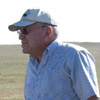


Select one of the options below:
This online master’s in agriculture gives you the knowledge and skills necessary to operate an agricultural business efficiently and sustainably without sacrificing profits.
Earn your master’s in agriculture online in a multi-disciplined program that blends animal science, business, range science, ecology, wildlife, policy, and human resources.
Explore how agricultural resource systems work together in a comprehensive way, and how to apply them in an agricultural management setting.
One of the only programs of its kind in the nation, this master’s degree in agriculture caters to working professionals with full-time jobs and busy schedules. Some unique attributes of this program are:
Learn to be an active problem solver focused on long-term resource sustainability solutions for the agricultural industry, with a focus on creating specific solutions to unique problems agriculture businesses may face.
Complete your master’s online in as little as 24 months or take up to five years, depending on your schedule and goals.
Highly skilled agriculture and natural resources professionals are needed to meet the demand for sustainable management of land and resources in today's rural and urban communities.
As an interdisciplinary program, the curriculum applies to professionals seeking to advance their careers in a number of diverse fields:
What do students have to say about our integrated resource management master's degree program? Get a glimpse of their experiences, hear what they think about CSU's faculty and curriculum, and discover how online education is impacting people just like you.
See how Geoff utilized his sustainable agriculture master’s degree and internship to merge his love of farming and craft beer, ultimately allowing him to design and land his dream job with Oskar Blues Brewery.

I grew up in southcentral Kansas near the small town of Zenda on a small dryland wheat and livestock operation. We ran about 40 head of Angus and Angus/Hereford cross cattle. In addition, we also raised a few hogs (when the price was right), chickens for both eggs and butchering, and had a big garden as well as some fruit trees. We were essentially self sufficient except for a few of the staples like sugar and salt. I originally thought I wanted to be a forester, but changed my mind when I got to college (not unusual). I decided to get into something I at least knew a little about, so I changed my major to range management. All three of my degrees are in range with emphasis in grazing management related issues for both my master's and Ph.D.
I have worked in the shortgrass, midgrass, and tallgrass prairies, the Nebraska Sandhills, and high elevation mountain shrub and grasslands. I gained a lot of practical experience working with improved forages in both the subirrigated hay meadows in the Nebraska Sandhills and the mountain hay meadows in western Colorado. Working with improved forages has allowed me to combine my interests in agronomy with pasture and livestock production. I am particularly interested in livestock/plant interactions, selection of forage species for different objectives, seeding methodology, improving forage quality by interseeding of legumes into grass stands, and the use of alternative forages for extending the grazing season. In my free time, I like to hike, backpack, and snowshoe in the mountains. My wife and I also like to travel throughout the West visiting Native American ruins and identifying and photographing plants and birds along the way.

Robyn earned her Master of Agriculture in Integrated Resource Management from Colorado State University. She has a dual Bachelor of Science in Animal Science and Agricultural Business, and a Bachelor of Arts in Journalism and Technical Communication. She has taught in the IRM program since 2015.
She owns a couple of different businesses, including an agricultural media company and a livestock business. She raises show quality registered dairy goats, registered boer goats and show wethers, and has a small commercial cattle operation.

Dana Hoag grew up in the Colorado Mountains. He received his bachelor's and master's degrees at CSU in agricultural economics, specializing in production and farm management. He received his Ph.D. from Washington State University where he worked on soil conservation and the conservation reserve program. He developed an interest in how policies affect land management, especially conflicts and complementarities between conservation and working lands.
He works on farm and ranch management issues where innovation and integration are important, including: farm and ranch management, risk and uncertainty, finding ecosystem services such as hunting and sequestering carbon on private lands, soil and water conservation issues, and policy issues related to managing private lands, including water, price and income supports, taxes and subsidies, and innovations.

I grew up in Texas farming and raising cattle. I went to San Angelo, Texas for an undergraduate in animal science from Angelo State University. I took my first full time job as a county extension agent in Del Rio, Texas which is on the border with Mexico. I was a county agent for 3 years and then took a job managing a 74,000 acre ranch north of Del Rio. This ranch was very diversified with meat goats, hair goats, sheep, hunting, and cattle.
It was a great experience but my wife and I decided to go to graduate school at Texas A&M. I earned a master's degree in ruminant nutrition and a Ph.D. in meat science. I have been at CSU for 11 years. My research interests are with reproductive strategies to help producers streamline their breeding process, minimize labor, and be profitable. I enjoy working with a variety of people and disciplines. I am married to an amazing lady (23 years) and we have 4 kids (Shayla, Keri, Kace, and Sawyer). I am passionate about my faith, family, and work in that order.

My professional/education interests are currently and passionately focused on developing Virtual Field Trips for anyone who is interested and as a support tool for classes, both on-line and face-to-face. Since retiring, for "real-person" enjoyment I like to botanize, hike, play with our dogs, ski, canoe, explore wild places, work on finishing our new house in the mountains, eat good food, drink good beer and wine, and encourage our daughters to figure out what the hell to do with their lives.
Most of all my wife and I enjoy doing all of these things in one of the most beautiful places on earth - southern Routt County. Before retiring, in addition to doing all the professional stuff, my wife and I ran a small farm (started out as 105 ac) north of Fort Collins, raised our girls in a rural environment, and learned how to lose money and repair old, used equipment. Now that we live near Steamboat Springs, I look out on the immense hay fields around here and fantasize about what it must be like to cut hay with one of these fancy, new swathers with air conditioning and an audio system you can hear.
This degree requires:
The integrated resource management specialization in this online agriculture master's degree allows you to take the ten required courses in the order that best suits your educational and professional needs. All online courses combine the same rigorous training as campus courses with directed hands-on, problem-solving experiences that apply to real-life land management scenarios.
This program teaches you to be a capable professional in agriculture, government, and natural resources careers. For example, alumni can:
Your capstone course, AGRI 640, is a culmination of the previous ten classes and results in a final project. This course should be taken in your last semester of coursework.
Students can be admitted in fall, spring, and summer. Applications are often accepted after the deadlines below.
| Fall semester | July 15 |
| Spring semester | December 1 |
| Summer semester | April 1 |
Start your application online and upload materials directly into the online system. You can save your progress and return any time.
Apply NowThe integrated resource management (M.Agr.) degree requires applicants to have the following:
Note that meeting the minimum department standards does not ensure admission to the program. Admission to Colorado State University graduate programs is based on a number of factors, including prior academic and professional experience and the personal statement.
Prepare the materials below and upload when you apply online.
Complete the online graduate application and pay the nonrefundable application processing fee (payable online). As soon as you have completed the required information, please submit your application. Your application will not be reviewed until it is complete and all required materials have been received.
CSU's Graduate School offers several application fee waiver opportunities. Visit their website to determine if you are eligible for a waiver.
Request one official transcript of all collegiate work completed from all institutions attended. Transcripts from Colorado State University are not required. Transcripts must be received directly from the originating institution to be considered official.
Please Note: Students may be unconditionally admitted and registered in their first semester of courses with an unofficial transcript. Official transcripts must be submitted, prior to or during your first semester, before you can register for your second semester of graduate work. Failure to meet this condition will result in your dismissal from the Graduate School.
Electronic (preferred): Digital Transcripts must be submitted by the originating institution using a secure service such as parchment, eScrip-Safe, the National Student Clearinghouse, or e-Quals. Transcripts received via emails are considered unofficial. Use institution code 4075 for Colorado State University or gradadmissions@colostate.edu if the secure service requires an email address.
Mail (if necessary) Graduate Admissions Colorado State University – Office of Admissions 1062 Campus Delivery Fort Collins, CO 80523-1062
View your application status at any time to ensure your application checklist is complete or to check on updates.
Once your complete application, including supporting materials, is received, the department admission committee will review your application and promptly notify you of their decision.
Proof of English language proficiency is required for applicants from countries or United States territories where there are official languages other than (or in addition to) English. This includes the U.S. territories of American Samoa, Guam, the Northern Mariana Islands, and Puerto Rico.